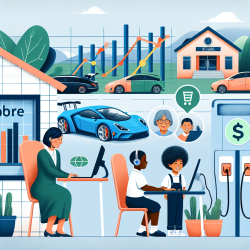Introduction
In the realm of online therapy services for schools, understanding and addressing disparities in accessibility is crucial. While the research article titled "Income and racial disparity in household publicly available electric vehicle infrastructure accessibility" focuses on electric vehicle (EV) infrastructure, its findings offer valuable insights that can be applied to the field of online therapy services. This blog post explores how practitioners can leverage these insights to improve their skills and create better outcomes for children.
Understanding Disparities in Accessibility
The research highlights significant disparities in access to EV infrastructure based on income and race. Lower-income groups and certain racial communities, particularly Black households, face reduced accessibility to public EV infrastructure. These findings underscore the importance of equitable access to resources, a principle that can be directly applied to online therapy services.
Applying Research Insights to Online Therapy
For practitioners in online therapy services, the key takeaway is the need to ensure equitable access to therapy resources for all students, regardless of their socio-economic background or racial identity. Here are some actionable steps practitioners can take:
- Conduct Accessibility Assessments: Evaluate the accessibility of online therapy platforms for students from diverse backgrounds. Consider factors such as internet connectivity, device availability, and digital literacy.
- Tailor Interventions: Develop customized therapy plans that consider the unique needs and challenges faced by students from different socio-economic and racial backgrounds.
- Advocate for Resources: Work with schools and local governments to advocate for resources and infrastructure that support equitable access to online therapy services.
- Collaborate with Stakeholders: Engage with parents, teachers, and community organizations to identify barriers to access and develop strategies to overcome them.
Encouraging Further Research
The research on EV infrastructure accessibility highlights the importance of data-driven decisions. Practitioners in online therapy services should be encouraged to conduct further research to identify and address disparities in access to therapy services. This could involve collecting data on student demographics, therapy outcomes, and access barriers to inform future interventions.
Conclusion
By leveraging insights from research on disparities in infrastructure accessibility, practitioners in online therapy services can enhance their skills and create more equitable outcomes for children. Ensuring that all students have access to the resources they need is essential for fostering their development and success.
To read the original research paper, please follow this link: Income and racial disparity in household publicly available electric vehicle infrastructure accessibility.










